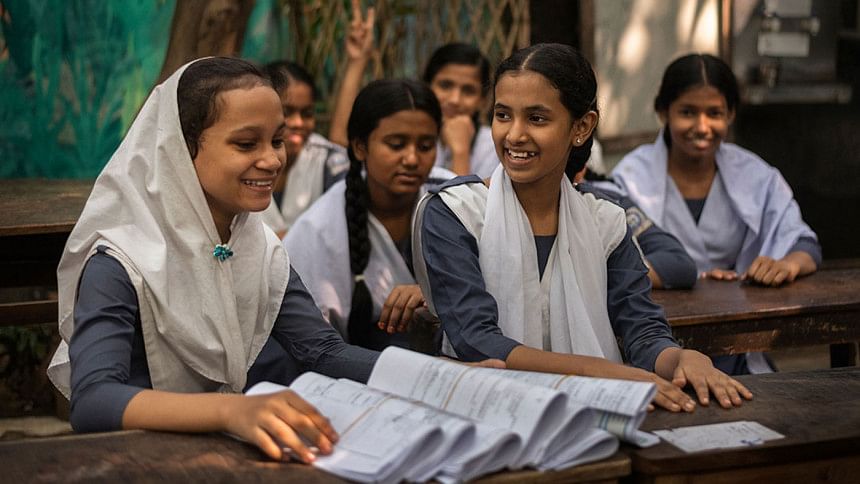Bangladesh expands life-saving HPV vaccination campaign to protect millions of girls against cervical cancer

Cervical cancer remains a significant public health concern in Bangladesh, claiming the lives of approximately 5,000 women each year. Yet, this deadly disease is preventable with the human papillomavirus (HPV) vaccine, which has shown to reduce cervical cancer risk by nearly 90% among vaccinated girls. To address this, the interim government of Bangladesh, in collaboration with international partners, launched the final phase of the HPV vaccination campaign on 24 October 2024, targeting 6.2 million girls aged 10-14 across the country's seven divisions: Barishal, Chattogram, Khulna, Mymensingh, Rajshahi, Sylhet, and Rangpur. This campaign follows a successful initial phase in October 2023, during which over 1.5 million girls in the Dhaka division received the vaccine.
The campaign is supported by Gavi, the Vaccine Alliance, UNICEF, and the World Health Organisation (WHO), which have jointly worked to procure and distribute 6.2 million vaccine doses this year. The initiative is part of a global effort to increase access to the HPV vaccine and to protect girls from cervical cancer. Thabani Maphosa, Chief Country Delivery Officer at Gavi, highlighted the significance of this launch, stating, "Today's launch means millions more girls will be protected against cervical cancer in the years to come."
The final phase of the campaign will run for a month, with vaccination sessions taking place at educational institutions and designated vaccination centres from 8:00 AM to 3:30 PM, excluding weekends and public holidays. The campaign targets girls in grades five to nine and out-of-school girls aged 10-14. To facilitate access, vaccination is free of charge after registration on the "VaxEPI" app or the dedicated website.
Dr. Bardan Jung Rana, WHO Representative to Bangladesh, emphasised the importance of this public health initiative, stating, "The HPV vaccination campaign led by the Ministry of Health and Family Welfare is a life-saving measure that can significantly reduce the risk of cervical cancer and protect future generations. Our commitment is clear: to ensure that every girl between the ages of 10 and 14 receives her HPV vaccine during the nationwide campaign in October and November 2024."
The campaign's planning and execution include comprehensive measures to reach marginalised groups, such as out-of-school girls, girls in informal and religious schools, and those living on the streets. UNICEF Representative OIC to Bangladesh, Emma Brigham, praised the government's efforts to ensure that no girl is left behind, noting that the campaign aims to overcome barriers that have previously limited vaccine access.
As part of the initiative, WHO and UNICEF are closely collaborating with the government to manage vaccine logistics, including supply chain and cold chain maintenance, real-time supervision, and safety monitoring. Additionally, efforts are being made to engage female educators, particularly in religious and English-medium schools, to encourage vaccine uptake. Healthcare workers will be deployed in communities where vaccine registration and access have been challenging.
The ongoing campaign builds on the momentum of the initial phase in Dhaka, where more than 1.5 million girls were vaccinated with a single HPV vaccine dose. The goal of the current phase is to cover the remaining seven divisions, furthering Bangladesh's commitment to reducing cervical cancer and protecting women's health.
The initiative aligns with Gavi's broader aim of reaching 86 million girls worldwide with the HPV vaccine by the end of 2025. In 2023 alone, Gavi supported the vaccination of over 14 million girls, including the 1.5 million girls in Bangladesh.
Following the conclusion of the current campaign phase, the HPV vaccine will be incorporated into Bangladesh's routine immunisation program. This will include vaccinating girls in grade five and 10-year-old girls who are not enrolled in the formal education system, ensuring sustained protection against cervical cancer for future generations.
By expanding access to the HPV vaccine, Bangladesh is taking a significant step towards safeguarding the health and well-being of its girls and women, thereby contributing to a healthier and cancer-free future for all.
Source: UNICEF

 For all latest news, follow The Daily Star's Google News channel.
For all latest news, follow The Daily Star's Google News channel. 



Comments